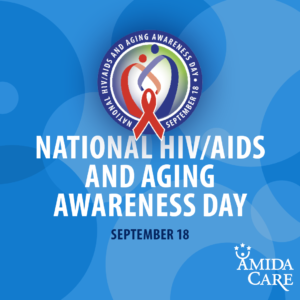National HIV/AIDS and Aging Awareness Day: Living Longer & Better

In the U.S., people living with HIV are living longer than ever, thanks to effective medical treatment. Though new HIV diagnoses are declining among people aged 50 and older, it is estimated that by the end of this year, approximately 70 percent of Americans living with HIV will be in that age group. Survival rates are on a general upswing, but there are many challenges in diagnosing and treating HIV among older Americans.
September 18 is National HIV/AIDS and Aging Awareness Day (NHAAAD), a day to focus on the growing number of people living long, full lives with HIV. It’s also an opportunity to increase awareness about the age-related challenges of HIV prevention, testing, treatment, and care.
Prevention and Treatment
Although HIV risk factors are similar for all adults, older adults may be less aware of the importance of testing to detect HIV in its earliest stages. Older people may also mistake HIV symptoms for those of normal aging, and they are more likely than younger people to have late-stage HIV infection at the time of diagnosis, which means they start treatment late and possibly suffer more immune-system damage.
Additional challenges to prevention and treatment:
• Older women who are no longer worried about getting pregnant might not feel the need to practice safer sex.
• Older people are less likely to talk about their sexual habits to their doctors, who are less likely to ask.
• Medical providers don’t always test older adults for HIV because of misconceptions that they are no longer sexually active.
Disparities and Barriers to Care
Racial disparities among older Americans with HIV are less pronounced than in younger people, but they do still exist, with more new diagnoses occurring among Black men over 50 than in other populations.
Stigma about HIV is also big factor among older Americans, especially those in the LGBTQ community, who may not seek testing or treatment because of fears regarding discrimination. Additionally, those with illnesses or who have lost family and friends may fear further isolation due to HIV.
There are several ways to address these challenges:
• Educate older people about the importance of preventing risky behaviors using age-sensitive information and tools. (ACRIA Center on HIV & Aging at GMHC is a good resource.)
• Fight stigma, especially in forms specific to this age group.
• Deliver effective prevention and protocols for antiretroviral adherence therapy for older Americans.
• Encourage physicians to discuss sexual activity and screen for HIV among patients of all ages.
Managing Age-Related Conditions
A major issue for many over age 50 is management of medication for HIV along with other age-related chronic conditions, such as diabetes, cardiovascular disease, and arthritis. Amida Care’s pharmacy team works closely with patients and providers to avoid problematic drug-on-drug interactions and side effects and to ensure uninterrupted access to care.
Americans living with HIV are truly living longer and better. Let’s make sure that older people are always included in HIV outreach, testing and treatment, so that they can continue to enjoy their lives fully.
Resources
National HIV/AIDS Awareness Day (HIV.gov)
Fact sheets on HIV and aging:
• HIV and Older Adults, from AIDSinfo
• HIV Among People Aged 50 and Over, from CDC
• HIV, AIDS, and Older People, from the National Institute on Aging
HIV treatment recommendations for older adults:
• Older Patients with HIV (AIDSinfo)
Additional information:
• AIDSource: Specific Populations: Aging Adults, NIH National Library of Medicine
• National Resource Center on HIV & Aging
